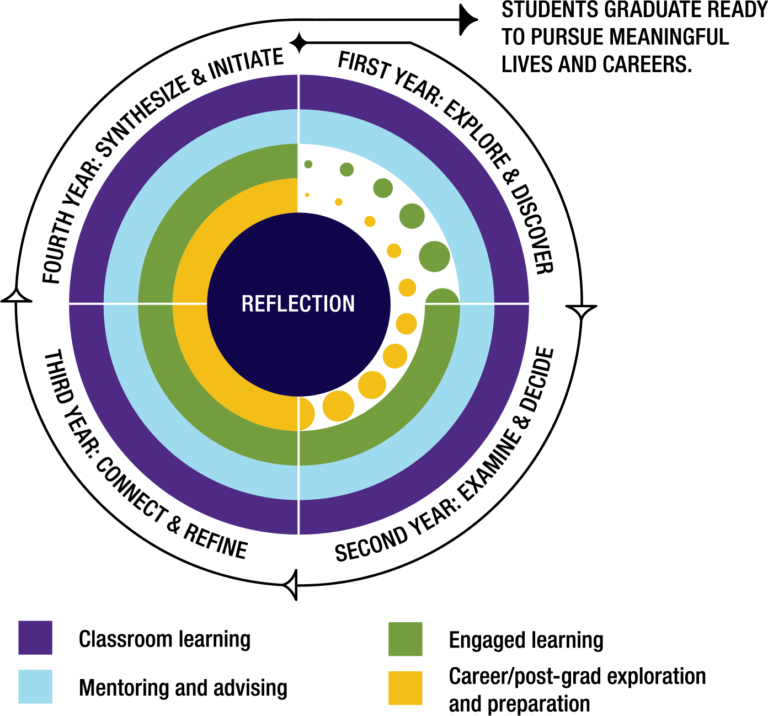The Furman Advantage
An aerial view of Furman University.
On the individual level, a Furman student’s growth unfolds through the support and mentoring of faculty, staff and peers, as the student progresses through the guided four years of The Furman Advantage. On an institutional level, Furman University is rising and adapting to our current health and economic crisis, steadily meeting the challenge of providing an unparalleled education amid a global pandemic.
On both levels, we have shown that our students, The Furman Advantage and the university itself are resilient and adaptable in the face of profound disruption and uncertainty. While we have adjusted the way we mentor and educate for the current environment, our commitment to our students stands unshaken and unchanged.
– BETH PONTARI
A professor of psychology and associate provost for engaged learning, from the report on The Duke Endowment’s Student Resilience and Well-Being Project.

In 2016, President Elizabeth Davis launched The Furman Advantage with $47 million from The Duke Endowment. This integrated pathway, guided by a diverse community of mentors, prepares students for lives of purpose and accelerated career and community impact – demonstrating the value of a Furman education. We then partnered with Gallup to assess whether Furman was fulfilling the promise of The Furman Advantage. Results showed that our alumni surpassed the national average in Gallup’s “Big Six” college experiences.
Through this strategic integrative framework, we are building on our longstanding strengths to guarantee all students an education that combines classroom learning with real-world experiences, reflection and mentoring.
This also means helping our students to identify what they do best and then apply their unique strengths to their academics and their lives overall. Furman was one of five universities to earn a 2020 Don Clifton Strengths for Students Award. At the center of the program is the Clifton Strengths assessment, which analyzes 34 talent themes and descriptors such as “activator,” “achiever” and “relator.” Furman’s program now includes eight certified coaches and 20 strengths champions, and touches nearly every aspect of student engagement on campus.
Our students have many opportunities to apply and practice what they are learning and use their strengths, skills and passion for community good.
In service of this mission, Furman was one of four institutions of higher education to participate in The Duke Endowment’s Student Resilience and Well-Being Project. It followed the class of 2018 from pre-matriculation through graduation. When the findings were released in December of 2019, they affirmed what we knew, that Furman students felt their holistic educational experience prepared them for life’s journey ahead. Overall, students reported strong engagement with faculty and staff and great access to strong support resources and high impact experiences. We also gathered some unexpected insights, which are helping to inform the ways the university can continue to distinguish the student experience.
- We’re enhancing our efforts to build affinity and prove the value of a Furman degree amid the new realities of an altered economic outlook.
- Through the resilience project, we’re placing more emphasis on developing lifelong coping, time-budgeting and stress-management habits.
- We’re adapting postgrad career support and graduate studies for students to equip them for the emerging contours of a post-pandemic employment landscape.
- And we’ll continue to measure how we’re doing to ensure we’re delivering on our promise.
– SAM YBARRA ’20,
The winner of the first annual Paladin Pitch competition put on by Furman Innovation and Entrepreneurship.
- Settle into a new environment and gain a sense of belonging
- Connect with your advisor
- Begin to discover skills, interests and goals through academic coursework and activities
- Prepare for engaged learning opportunities through coursework and conversations with advisors and mentors
- Begin to explore opportunities in engaged learning
- Select a major that meets life and career goals
- Focus area of study through classroom learning, reflection, mentors and advisors
- Select engaged learning such as an internship, study away, research or community project
- Apply knowledge and skills to meet real-world challenges
- Reflect upon experiences
- Integrate all you have done to create your narrative for employers and graduate schools
- Graduate ready to pursue a meaningful life and career

Source: First Destinations Survey
What can we do to help our students manage interpersonal conflicts and family crises, cope with academic stress, budget their time and take ownership of their circumstances? What changes can we pursue to ease the institutional barriers that may slow a student’s progress or ability to bounce back from difficulties?
In the course of the Student Resilience and Well-Being Project, Furman identified counselors and case managers/student success coordinators as key advocates for students, ensuring they had the tools and resources to assist students in developing their resilience and ability to adapt to unforeseen circumstances. Similarly, we created the freshman-sophomore Pathways advising course to build a strong foundation of academic, social and coping skills to strengthen student resilience. The Pathways course assists the student’s development of self-efficacy and confidence in overcoming the inevitable barriers that arise in a collegiate experience. Early data has signaled that this two-year advising course enhances students’ ability to rebound in the face of uncertainty, particularly students who struggle academically in their first year. The course aims to help power students’ trajectory into their majors and their high impact experiences.
Furman faculty and student-experience staff members have embraced Nevitt Sanford’s “challenge and support” model of student development theory as a key ingredient in helping students strengthen their resilience skills. In practice for decades, Sanford’s theory is now being embraced throughout the academy as a way to manage both the academic and social rigor of the university experience, preparing students for life beyond Furman’s campus.
The project identified four key foundations for resiliency – engagement with academics, the ability to set goals and follow through with them even in the face of challenge, self-compassion (treating oneself with kindness, even in the face of failure), and relationships with peers, faculty and staff. These findings guide the way we train advisors and have highlighted the importance of not only challenging our students, but supporting them.
Furman students are driven and high-achieving. They are highly engaged with their academics, and their interactions with faculty help buffer them from stress. But there is a downside. While students consistently report that they experience the most stress due to academics, unlike at other institutions, this does not dissipate as students develop. They also report that Furman has a culture of achievement and performance. Students perceive their peers as valuing being “perfect” and “on top of everything.” These insights help inform how we train advisors and faculty to support students. Indeed, giving credence to the long-held belief of the rigors of a Furman education, the university’s integrative project team of faculty researchers and student life practitioners worked collaboratively to inject the challenge and support model as a way to ensure students remained challenged while also benefitting from support systems, providing students with new tools for adapting, pivoting and working through challenges.
– LADAVIA DRUMMOND JUST ’02
The opening Convocation speaker in 2019 and Fulbright scholar in Uganda.
One simple but far-reaching effect of using these data was a policy change. Data revealed that students were increasingly asking health professionals to grant excuses for class attendance. The university instituted a change in which health providers would no longer provide absentee notes for anything other than major issues such as surgeries or serious illness, encouraging students to engage faculty directly about their well-being and balancing their academics. By taking away the crutch of health care provided excuses, students learn to work with faculty and develop better strategies for facing their academic challenges, while faculty also the have the opportunity to support their students and help them develop independent self-care skills.
Significant academic stress extends past a student’s first year, often affecting a student’s full four years. As a result, Furman has integrated time management and study skills into the first year of Pathways, the university’s two-year advising curriculum.
We learned through the study that many students had suffered the death of a person who was central to their lives prior to or while in college, testing the students’ resilience. In response, university counselors and chaplains, along with community grief counselor partners, instituted a grief group. Students expressed such interest that it has continued, and campus practitioners have expanded their use of groups to other areas of emotional health and well-being.
American University
Clemson University
Columbia University
Cornell University
Duke University
Emory University
The George Washington University
Georgetown University
Georgia Institute of Technology
Indiana University
Johns Hopkins University
The Medical University of South Carolina
New York University
University of Georgia
University of North Carolina at Chapel Hill
University of South Carolina
University of Texas
University of Virginia
Vanderbilt University
Wake Forest University
Accenture
AmeriCorps
Bank of America
Blackbaud
Bloomberg
Centers for Disease Control and Prevention
Deloitte
Elliott Davis LLC
Ernst & Young
Greenville (S.C.) County Schools
IBM
KPMG
Lima One Capital
Morgan Stanley
Net3 Technology
PGA Tour
Prisma Health
Project Hope
Safe Harbor
ScanSource
SpaceX
Stryker Corporation
Teach For America
The Walt Disney Company
Thermo Fisher Scientific
US Department of Commerce
Wayfair